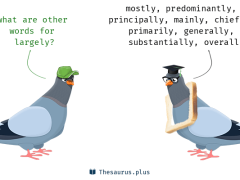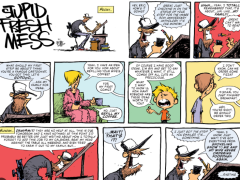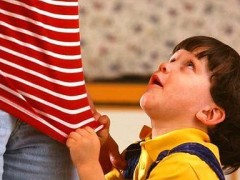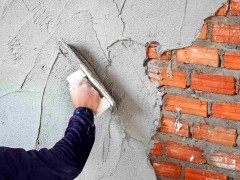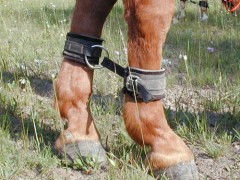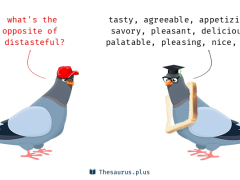largely [ˈlɑːdʒli] adv. 很大程度上
comic [ˈkɔmik] adj. 喜剧的,可笑的
【派】comical 滑稽的
【扩】comedic 喜剧的
【搭】a comic performance 滑稽表演 comic opera 喜歌剧
universal [juːniˈvəːsəl] adj. 普遍的
【扩】prevalent 普遍的 pervasive 普遍的
【搭】universal suffrage 普选权
* * *
A: Football is a universal game.
B: Yes, it's very popular in our country, too.
A:足球是一项全球性的运动。
B:是的,在我们国家也很流行。
* * *
comedian [kəˈmiːdiən] n. 滑稽演员,喜剧演员
【例】The comedian's performance made all the audience laugh.
喜剧演员的表演把所有观众都逗乐了。
distasteful [diˈsteistfəl] adj. 讨厌的
pester [ˈpestə] v. 一再要求,纠缠
dread [dred] v. 惧怕
【派】dreadful 令人畏惧的
* * *
A: I really dread the exam.
B: You still have much time to prepare it.
A:我实在害怕这次考试。
B:你还有很多时间去准备。
* * *
recovery [riˈkʌvəri] n. 康复
【搭】economic recovery 经济复苏
* * *
A: Trust me. You will make a recovery soon.
B: Did the doctor say so?
A:相信我,你很快就会康复的。
B:医生这么说吗?
* * *
plaster [ˈplɑːstə] n. 熟石膏
console [kənˈsəul] v. 安慰, 慰问
【搭】console sb. with sth.
用某方式安慰某人
【例】We tried to console her when her grandfather passed away.
她爷爷去世的时候我们尽力安慰她。
hobble [ˈhɔbəl] v. 瘸着腿走
【派】hobbler 瘸子
【扩】lame 瘸的
【例】The old man hobbled along with the aid of his stick.
那老人借助手杖蹒跚而行。
compensate [ˈkɔmpenseit] v. 补偿
【派】compensation 补偿,赔偿
【搭】compensate for 为……提供补偿
* * *
A: We can't ensure on-time delivery.
B: You should compensate us.
A:我们无法保证按时给您送货。
B:你们得补偿我们。
* * *
mumble [ˈmʌmbl] v. 喃喃而语
【搭】mumble in dream 说梦话
* * *
A: Don't mumble your words.
B: Sorry, I didn't know the meeting had begun.
A:别喃喃而言。
B:对不起,我不知道已经开始开会了。
adverb [程度副词]很大程度上,主要地、广泛地、大量地 - Largely is used to introduce the main reason for a particular event or situation.
adjective [原级]滑稽的,好笑的;喜剧的 - Comic is used to describe funny entertainment, and the actors and entertainers who perform it.
noun [专属名词]喜剧演员;连环漫画 - The comics is the part of a newspaper that contains the comic strips.
adjective [原级]普遍的,全体的,全世界的;通用的,万能的;(逻)全称的,总称的 - The insurance industry has produced its own proposals for universal health care.
noun [抽象名词]普遍原则,通用原理;普遍看法,普遍特征;(逻)全称命题;(哲)普遍,一般概念;(哲)共相;(语言学)普遍现象,通用规则 - Smile is a universal language.
noun [专属名词]喜剧演员,滑稽演员;剧作家;有趣的人,滑稽的人;(有时指言行)没意思的人,无聊的人 - I'm going to write good jokes and become a good comedian.
verb [vt. 及物动词]纠缠,烦扰;使烦恼 - I thought she'd stop pestering me, but it only seemed to make her worse.
verb [vt. 及物动词]畏惧,担心;<古>敬畏 - I dreaded coming back, to be honest.
noun [抽象名词]害怕,畏惧;令人生畏的人,可怕的事物;(鸥鸟等鸟群的)惊飞,惊起;<英,非正式>将头发编成“骇人”发型的人,拉斯塔法里派成员 - Dread is a feeling of great anxiety and fear about something that may happen.
adjective [原级]令人生畏的,可怕的;恼火的,生气的 - If you say that you dread to think what might happen, you mean that you are anxious about it because it is likely to be very unpleasant.
dread doing sth. 害怕做某事
- I dread being sick.
- He dreaded having to spend Christmas in hospital.
live in dread of ... 一直害怕sth.
- The committee members live in dread of anything that may cause a scandal.
- We live in dread not only of unpleasant insects like spiders or wasps, but of quite harmless ones like moths. NCE3-54
noun [抽象名词]康复,痊愈;戒除;恢复,复苏;(供刚做完手术的病人使用的)监护室;(被拿走或失去的东西的)复得,找回;收回的物品(资金);(破损车辆或坠毁飞机)回收修理;(高尔夫)挽回败局之击,复原之击(击回球道或球穴区);(美橄)重新获球;(划船,自行车赛,游泳)还原至预备姿势(如回桨等);回收利用(能源、化工品等) - When there is a recovery in a country's economy, it improves.
noun [物质名词]灰泥;熟石膏;<英>创可贴,膏药 - There were huge cracks in the plaster, and the green shutters were faded.
verb [vt. 及物动词]用灰泥抹(墙等);(用某物)涂抹,覆盖;大量张贴,贴满;使…紧贴;把(头发)梳平;敷石膏于,敷膏药于;(新闻报道)充斥于(报纸版面) - If you plaster a wall or ceiling, you cover it with a layer of plaster.
verb [vt. 及物动词]安慰;慰藉 - I can console myself with the fact that I'm not alone.
noun [专属名词]控制台,仪表盘;电视机(或收音机)柜;风琴的操作部分;(带装饰的)支架,支托 - A console is a panel with a number of switches or knobs that is used to operate a machine.
verb [vi. 不及物动词]蹒跚;跛行 - He got up slowly and hobbled over to the coffee table.
verb [vt. 及物动词]使跛行 - I hurt my foot, and had to hobble home.
noun [抽象名词]跛行步态 - The country's massive debt could hobble the party's social-spending plans.
verb [vi. 不及物动词]赔偿,偿付;弥补,补偿;抵消;酬报(某人) - If you compensate for a lack of something or for something you have done wrong, you do something to make the situation better.
verb [vt. 及物动词]含糊地说,咕哝;(用无齿的牙床)费力嚼咬,咬磨 - Her grandmother mumbled in her sleep.
noun [抽象名词]喃喃自语,嘟哝 - He could hear the low mumble of Navarro's voice.
adjective [原级]令人反感的,令人生厌的;不合口味的;低俗的,下流的 - He found it distasteful to be offered a cold buffet and drinks before witnessing the execution.
| 动词 | 形容词 |
|---|---|
| disgust | disgusting |
| revolt | revolting |
| repel | repellent |
| repulse | repulsive |
